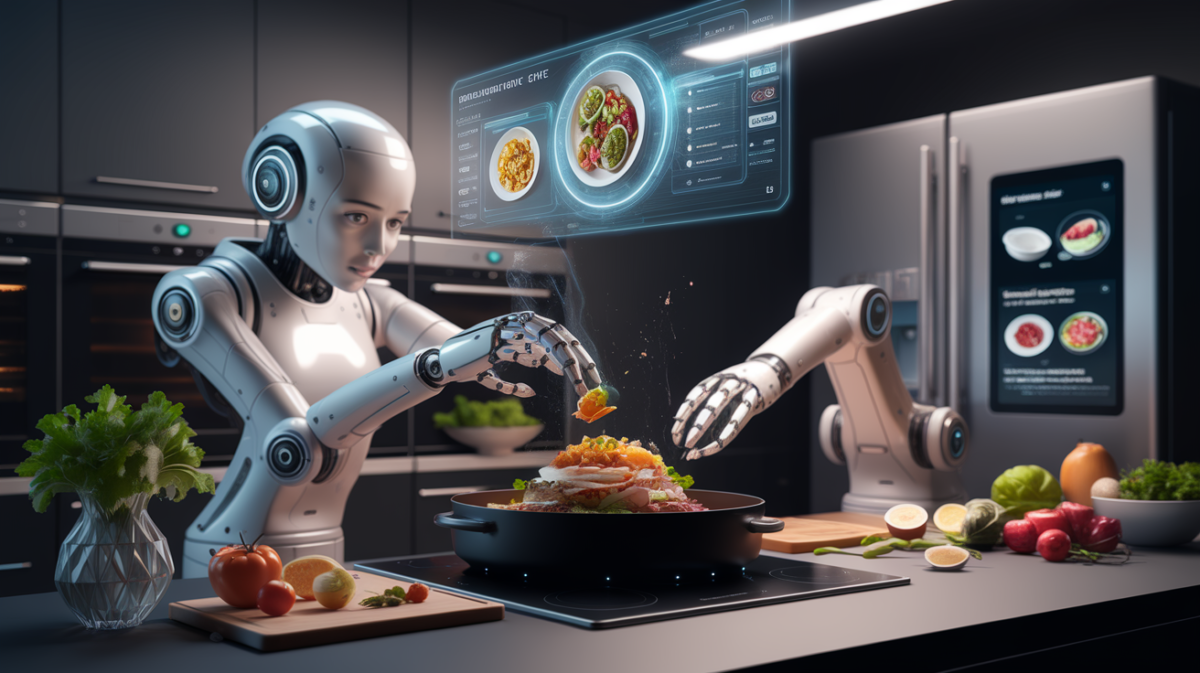Artificial Intelligence (AI) is no longer confined to tech labs or corporate boardrooms—it has found its way into the kitchen, transforming how chefs plan, prepare, and present food. From automating mundane tasks to crafting personalized dining experiences, AI is redefining the culinary arts. Here’s how this technology is changing the way we cook.
AI-Powered Meal Planning and Recipe Creation
Gone are the days of flipping through cookbooks or scrolling endlessly for recipe inspiration. AI-driven tools now analyze dietary preferences, nutritional needs, and even the contents of your fridge to suggest tailored meal ideas. For example:
- Samsung’s Food AI: Uses cameras to scan refrigerator contents and recommends recipes based on available ingredients.
- Yummly and Foodvisor: These apps offer personalized meal suggestions, making cooking more accessible for home chefs.
These innovations save time and reduce the stress of meal planning, allowing cooks to focus on creativity.
Smart Kitchen Appliances: Precision at Your Fingertips
AI-powered kitchen gadgets are bringing restaurant-level precision to home cooks. Here are some standout examples:
- June Oven: Recognizes food types and adjusts cooking times and temperatures automatically for perfect results.
- Moley Robotics: Features robotic arms that replicate gourmet techniques, handling tasks like stirring and flipping with ease.
These tools not only enhance efficiency but also ensure consistency, a hallmark of professional cooking.
Real-Time Cooking Assistance
AI isn’t just about automation—it’s also a virtual sous-chef. Tools like ChattyChef, developed by the Georgia Institute of Technology, provide interactive recipe guidance, helping cooks adapt dishes to dietary needs. AI-powered chatbots can also answer questions on the fly, suggesting ingredient swaps or troubleshooting common kitchen mishaps.
Reducing Food Waste with AI
Food waste is a global issue, and AI is stepping in to help. Innovations include:
- Winnow Solutions: Analyzes kitchen waste to guide better purchasing and portioning decisions.
- Smart Refrigerators: Track inventory and suggest recipes to use up ingredients before they spoil.
These technologies promote sustainability while saving money—a win-win for households and businesses alike.
Personalized Dining Experiences
AI’s ability to analyze customer data allows chefs to craft menus tailored to individual tastes. Whether it’s accommodating allergies or catering to flavor preferences, this level of personalization enhances dining satisfaction and builds customer loyalty.
Challenges and Ethical Considerations
While AI offers immense benefits, its integration into kitchens isn’t without hurdles. Key concerns include:
- The potential erosion of traditional cooking skills.
- The risk of homogenizing culinary experiences.
- Job displacement in the culinary sector.
- Food safety and accountability when AI systems fail.
Addressing these challenges responsibly will be crucial as AI continues to evolve in the culinary world.
AI in Kitchens: A Comparison
| Technology | Key Feature | Impact |
|---|---|---|
| Samsung’s Food AI | Scans fridge contents | Simplifies meal planning |
| June Oven | Auto-adjusts cooking settings | Ensures perfect results |
| Winnow Solutions | Tracks kitchen waste | Reduces food waste |
The Future of AI in Cooking
AI is undeniably reshaping the culinary landscape, offering tools that boost creativity, efficiency, and sustainability. While challenges remain, the thoughtful integration of this technology promises a more innovative and dynamic future for chefs and home cooks alike.
As AI continues to evolve, one thing is clear: the kitchen of tomorrow will be smarter, more intuitive, and more personalized than ever before.







